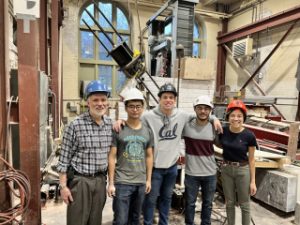As Canada faces the dual challenges of contending with a housing crisis at the same time as facing the impacts of severe climate change, the need to find innovative and practical solutions remains one of the nation’s highest priorities. McGill’s Professor Daniele Malomo was recently awarded $1.7 million by the Canada Mortgage and Housing Corporation (CMHC) for a proposed solution that addresses both problems.
An Assistant Professor of Structural Engineering, Professor Malomo’s target is to retrofit low-rise unreinforced masonry structures using modularly designed timber panels that will not only add insulating benefits but will also improve their structural capacity. During preliminary experiments conducted in summer 2023, thermal testing has shown that the retrofit can improve the insulating performance of these buildings by 400% – a major improvement that can promote significant reduction in the carbon footprint. Structural testing of the proposed retrofit revealed an increase in after-cracking lateral displacement of 100 times – this will contribute to save lives in case of earthquakes or other natural hazards, contributing also to making existing buildings compliant with current codes.
Innovative and sustainable retrofit solutions
“Our retrofit solution aims to facilitate the reuse and conversion into housing of Eastern Canada’s existing masonry buildings in a sustainable, affordable and scalable manner, increasing both energy and life-safety building performance,” said Professor Malomo. “Reusing under-utilized or vacant existing buildings is the fastest and most effective option available, and these funds from CMHC will help us making it an even more attractive solution.”
In addition to its performance improvements, using timber as a base retrofit material is more affordable than steel, concrete or textile. It is also easier to install and remove and can be done while occupants remain in residence. The proposal focuses on the densely populated urban centres of Eastern Canada, a low-to-moderate seismicity zone where 61% of the national population resides.
New hope for 3,000 vacant Montreal buildings
When applied at scale, this system has the potential to increase the rate and volume at which these buildings are converted for residential use. This strategy saves energy by making use of existing buildings while expanding options for housing in cities and supporting the economic viability of Eastern Canada’s urban centers. In the city of Montreal alone, some 3,000 buildings are vacant, and could potentially be retrofit using this method, thereby expanding available housing stock and avoiding the costs associated with demolition and replacement construction.
Professor Malomo has assembled a team of researchers from the University of California (Berkeley), Carleton University, and the University of Toronto, as well as various industrial partners, to ensure that the project moves forward toward practical application. The City of Montreal (Service de la gestion et de la planification des immeubles, SGPI, directed by Ing. François Buteau) is also a supporting partner, enabling the team to collect key data on existing masonry structures typical of Eastern Canada.
Multi-round competition nears conclusion
The Housing Supply Challenge is a $300 million, multi-round funding competition launched by the CMHC in December 2022 to offer an opportunity for innovators to present disruptive solutions that can effect change. The Building for the Future is the 4th Round in the competition, with the 5th and final round set to open later this year. The Challenge is part of Impact Canada and is led by the CMHC, in collaboration with the Impact and Innovation Unit in the Privy Council Office and Infrastructure Canada.
Photo caption (from left): McGill research team members Dr. Bill Cook (project engineer), Jiadaren Liu (postdoctoral researcher), Prof. Daniele Malomo (principal investigator), Moustafa El-Assaly (PhD student), and Wendy Garcia Mendez (PhD student) at the McGill Jamieson Lab, in front of an unreinforced masonry wall tested before retrofit application.
About McGill University
Founded in 1821, McGill University is home to exceptional students, faculty, and staff from across Canada and around the world. It is consistently ranked as one of the top universities, both nationally and internationally. It is a world-renowned institution of higher learning with research activities spanning three campuses, 12 faculties, 14 professional schools, 300 programs of study and over 39,000 students, including more than 10,400 graduate students.
McGill’s commitment to sustainability reaches back several decades and spans scales from local to global. The sustainability declarations that we have signed affirm our role in helping to shape a future where people and the planet can flourish.
link











More Stories
Recent Developments in the Canadian Economy: Fall 2023
Developer plans 936 multifamily units on former Rochester golf course
86 Companies, Including Bajaj Housing Finance, Ultratech Cement & Tata Motors, To Post Their Q2 Results Today